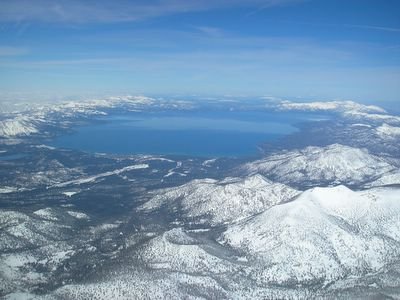 Dawn and I saw United 93 last night, and I've been thinking about it ever since. More than merely depicting the events of September 11, the film superbly conjured up the feel of the day - the confusion, the disbelief. The theater was never as silent as when the burning WTC appeared on screen, and I think every single person was remembering the first time they saw that horrific image and feeling the impact anew. It was emotionally draining.
Dawn and I saw United 93 last night, and I've been thinking about it ever since. More than merely depicting the events of September 11, the film superbly conjured up the feel of the day - the confusion, the disbelief. The theater was never as silent as when the burning WTC appeared on screen, and I think every single person was remembering the first time they saw that horrific image and feeling the impact anew. It was emotionally draining.Still, I'm glad I saw it. It really is an excellent movie, one that treats its subject with the seriousness it deserves. It is stark and uncompromising; it refuses to pander to the viewer. Going into the theater, I was prepared to cringe at Hollywood excesses of emotional manipulation or jingoism or cynicism, but I didn't find them. Having seen the movie, I'm now glad it was made, although it's definately not for everybody.
The film is made considerably more interesting by portraying not only the events onboard UA93, but also the unfolding of the day from the standpoint of the FAA, air traffic control, and the military. This is a story that hasn't been widely told yet, and it is a major key to understanding the events of 9/11 and why the government was so paralyzed in its response. We have a very accurate record of this story, wheras the hijackings have been only partially pieced together through CVR recordings and phone calls from the doomed aircraft.
Nobody knows exactly what happened on UA93. This movie represents an educated guess that is mostly consistent with what is publicly known. Obviously, all diologue outside of phone and radio calls is made up. Many depicted details of the hijacking are unknown, including exactly how the hijackers gained access to the cockpit (although the film's portrayal is plausible given the practices of the time). The final fight for the cockpit is somewhat consistent with what's on the recently-released CVR transcript, although the passengers didn't come as close to regaining control as the movie showed. But given what is publicly known about what happened on UA93, the movie is credible.
The aviation matter in this film is astonishingly accurate. It may be the most accurate mainstream aviation movie ever. The airline culture and flight crew interaction felt dead-on, which makes sense since most of the actors are real life pilots and flight attendants. Most of the flight deck displays, controls, warning systems, procedures, and callouts were accurate, although I picked a few discrepancies out. I'm not an air traffic controller, but from what I know of their world, their culture and procedures seemed to be portrayed quite well. It's worth noting that several of the air traffic controllers played themselves, as did the manager of the ATC system command center, Ben Sliney.
I'm saying that the movie was made about as excellent as anybody could possibly make it. That still does not answer the question of whether it should have been made. It seems deeply offensive to watch any reenactment of 9/11, no matter how accurate, for the sake of entertainment. I hope that nobody goes to this movie expecting to be entertained. More than anything, the clarity will sicken you. But that's why it needed to be made.
"Never forget" has become such a cliché that we've forgotten why it's important that we never forget. We're at danger of losing sight of the fact that we're at war. I'm not talking about Iraq. I'm talking about what's been rather inaccurately described as the "war on terror." Terror is a tactic, not an enemy. Our enemy is a loose confederation of radicals who believe it is their divine right and responsibility to slaughter those who oppose their plans for the imposition of their brand of religion on a large part of the world. They bombed the WTC in 1993, they publicly declared war on us in 1998, they attacked us a number of times between then and 9/11, and they've carried out several attacks worldwide since then. The war is still very much on.
Yet there are many people in this country now denying that the war even exists. They see politicians exploiting the fear for their own agendas, and conclude that those politicians must be manufacturing the fear, too. This is evidenced by the growing popularity of conspiracy theories surrounding 9/11. A rather benign one is that UA93 was shot down. Wilder conspiracy theories range from government foreknowledge of the attacks to goverment participation to the unhinged notion that planted explosives, not airplanes, caused the damage. Rather few people believe this, but there are many people who think the "war on terror" was manufactered by an administration eager to prey on public fear.
Yes, politicians have exploited the fallout of 9/11 for their own gain. Yes, the "war on terror" has been used to justify a lot of things you may oppose. This should not obscure the fact that the threat is still very real, and that this war threatens our survival as a free society. As the last attack on our homeland fades into distant memory, we need to be reminded of this. United 93 provides a rather stark reminder of why we must "never forget." That's why I consider it an important film.
















